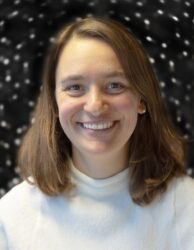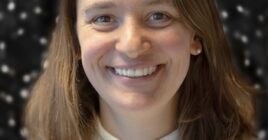
Staff Scientist, NCEM
510.486.5663
Biography
Stephanie (Steph) Ribet graduated from Princeton University with a degree in chemistry and minor in materials science in 2016. She worked as a chemist at Dyson/Sakti3 from 2016 to 2018 on solid-state battery development. She completed her Ph.D. in the Department of Materials Science & Engineering at Northwestern University with Vinayak Dravid in 2023. At Northwestern, she designed nanocomposite sponges and characterized these structures at multiple length scales with microscopy and spectroscopy techniques. In the final year of her graduate work, Stephanie joined the Molecular Foundry as an Office of Science Graduate Student Research Program Fellow to develop scanning transmission electron microscopy methods for soft and hybrid materials. Building on this research, she continued at Berkeley Lab as a postdoc working with Colin Ophus and Karen Bustillo on the experimental and computational development of multidimensional high-resolution electron microscopy methods. She began as a Staff Scientist at the Molecular Foundry in 2025.
Research Interests
Stephanie’s research focuses on (scanning) transmission electron microscopy (S/TEM) development at the intersection of computational, experimental, and hardware advances. In particular, she is interested in new ways to probe weakly scattering structures that are difficult to image with conventional methods. These systems include soft matter, composites, biological structures, and low-atomic number features in materials. Many of these structures are electron beam-sensitive, and Stephanie studies how cryo-electron microscopy coupled with advanced imaging techniques can allow for the characterization of materials that would otherwise be inaccessible.
The methods she develops are rooted in diffraction-based techniques, including nanobeam 4D-STEM and phase retrieval methods such as electron ptychography. Stephanie works on integrating these approaches with other multidimensional experiments including tomography, spectroscopy, in-situ studies, and correlative characterization tools. She develops hardware and studies how novel devices, such as phase plates, can modify the transfer of information in microscopy experiments. Her work includes the development of algorithms and computational tools in open-source code frameworks. Through collaborative efforts, this research is broadly applicable across many science and engineering disciplines.


